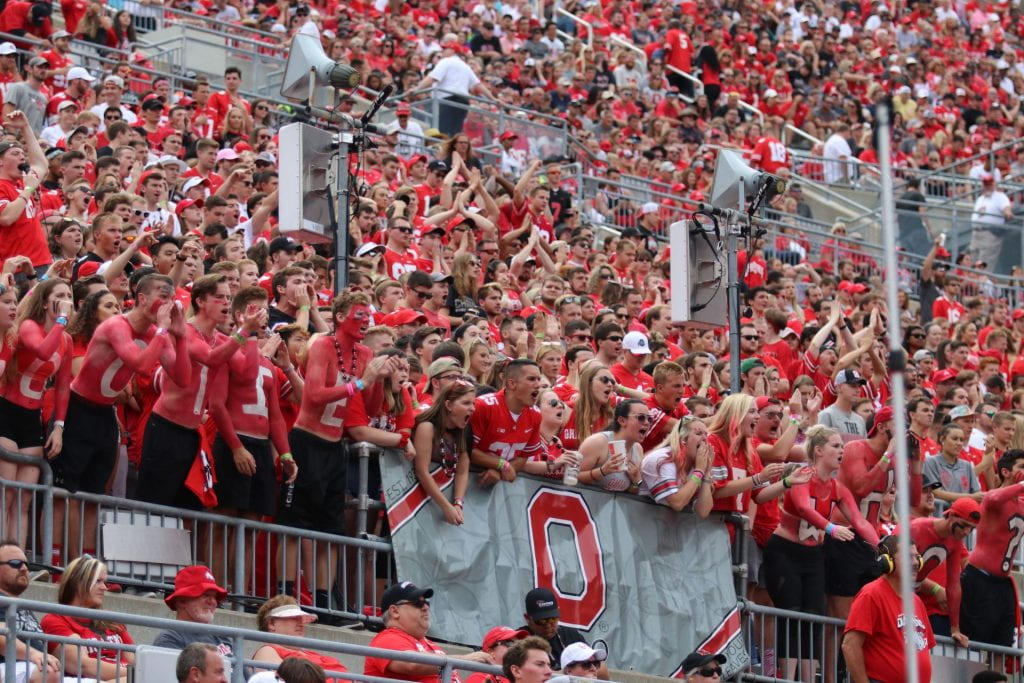
Fans in Block “O” student section cheer on the Buckeyes in the second half of the game against Florida Atlantic on Aug. 31. Ohio State won 45-21. Credit: Casey Cascaldo | Former Managing Editor for Multimedia
Any other year, Block “O” and its members would have completed a lot of their initial preparations and thousands of students would be awaiting their chance to cheer on the Buckeyes in Ohio Stadium. But this isn’t like any other year.
Instead, Block “O” president Nick Wead, a third-year in economics, is awaiting a decision that will shape the environment surrounding college football in the midst of COVID-19 concerns. With uncertainty halting the usual routine of the official student section of Ohio State, the group’s leadership is thinking of ways to keep the group relevant despite the guidelines that may be instituted in the coming weeks.
Preparation has been difficult for the group as the decision by the university on the allowance of spectators into Ohio Stadium and the state of the football season itself is yet to be made.
“We’re kind of at this waiting period where we’re waiting to hear from the university and trying to find out what we have to do to be able to operate or if we’re even able to operate in any capacity at that, so we’re not taking the normal steps we typically take to prepare for this season,” Wead said.
In a usual summer, Wead said that the planning for Welcome Week would be complete along with the initiatives for the football season, but an uncertain future has delayed the planning process.
While the university’s decision will certainly send shockwaves through Block “O” and impact its operating capabilities, the current climate of social distancing already promises to alter the Block “O” student sections’ traditional operations.
“We thrive on close interaction between students, and it’s very, very much a centralized type of deal — we’re in the same location, being loud together,” Wead said.
While preseason preparation begins July 13 for Ohio State football, the season and its ability to have spectators are still uncertain.
On May 20, Ohio State athletic director Gene Smith projected a possibility in which 20,000 to 50,000 fans could attend an Ohio State football game, but the recent decision by the Memorial Tournament in Dublin, Ohio to forgo its plan to have spectators is not a positive step toward fans at football games in the fall.
If students are unable to attend football games, Block “O” is looking into other avenues to share the football viewing experience. Wead and Block “O” vice president Catie Cleveland, a third-year in pharmaceutical sciences, noted that a watch party event, which the organization has hosted in the past, may be a viable alternative as long as it observes proper social distancing practices, but the university’s allowance of such a gathering is still unclear.
“We’re trying to find ways that even if we can’t get students in the same location, how can we still make them feel like they’re a part of the Block ‘O’ community,” Wead said.
Wead noted the idea of virtual engagement which could come in the form of virtual watch parties and social media engagement events.
Block “O” has already begun to use social media to incorporate sports by hosting a Q&A with men’s basketball head coach Chris Holtmann on Instagram live.
“Right now, we’re trying to get creative and think of the different ways we can still get sports involved,” Cleveland said.
Cleveland said they hope to have similar opportunities with coaches and players going forward and to make the events exclusive to Block “O” members in order to increase the incentive to join the organization.
The push toward increasing the value of being a member of Block “O” is important, Cleveland said. She noted that approximately 90 percent of Block “O” membership is made up from the student sections at sporting events, with the remaining students paying a $20 fee to join the organization.
Although the potential loss of the student sections in 2020 appears to be damaging to the organizations funding, which Cleveland said comes heavily from football ticket sales, Wead said that past treasurers have been successful at creating an emergency fund in case of an unforeseen situation like Block “O” currently finds itself in.
“We would obviously have the funds to do a lot of those things that we would want to, but what that looks like is definitely going to shift and change and what that money is going to be used for is also going to change based on how we’re able to operate,” Wead said.
The organization is also looking to continue its expansion beyond sports. Cleveland and Wead noted a movement toward community service and engagement is a focus of the organization.
“I think it makes a good point of finding new and creative ways to explore how the student section is operated and what Block ‘O’ is in the capacity of more than just the sports we participate in,” Wead said.


